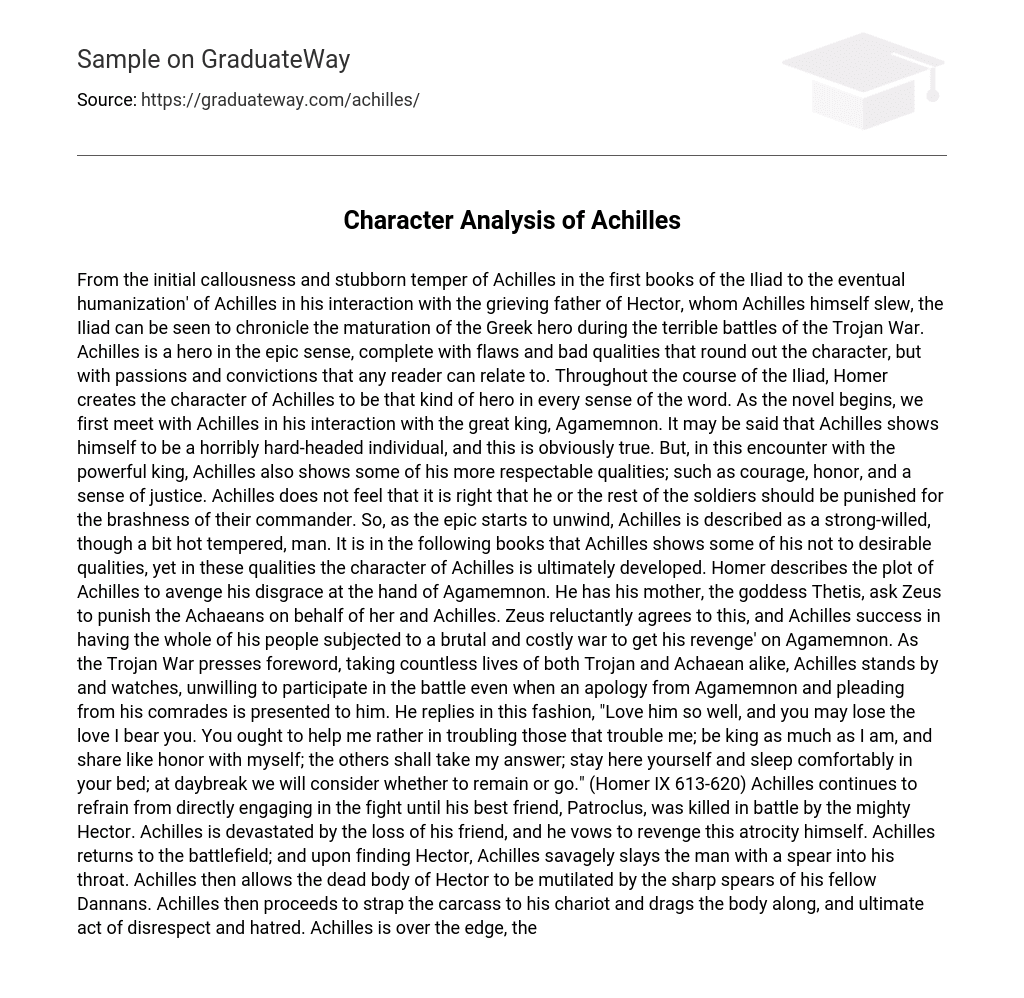From Achilles’ initial callousness and stubborn temper in the first books of the Iliad to his eventual humanization when he interacts with the grieving father of Hector, whom Achilles killed, the Iliad chronicles the maturation of the Greek hero during the brutal battles of the Trojan War.
Achilles is a fully-developed heroic character with both flaws and admirable qualities that make him relatable to readers. Homer presents Achilles as the epitome of a hero throughout the Iliad. The story introduces Achilles through his initial encounter with Agamemnon, the powerful king.
In this encounter with the powerful king, Achilles demonstrates his strong-willed nature and also displays courage, honor, and a sense of justice. He disagrees with the idea of him and the soldiers being punished for their commander’s actions. Thus, though he is acknowledged as a brutally determined individual, Achilles is described as a man with a fiery temper but admirable qualities.
In the books that follow, Achilles displays some of his negative traits. However, it is through these traits that the character of Achilles is ultimately shaped. Homer recounts Achilles’ plan to seek retribution for the disgrace inflicted upon him by Agamemnon. Achilles implores his mother, the goddess Thetis, to appeal to Zeus for punishment upon the Achaeans in his name. Though reluctantly, Zeus grants Achilles’ request, resulting in a brutal and costly war that embroils his entire people in his pursuit of revenge against Agamemnon.
Achilles, while the Trojan War rages on and claims lives on both sides, chooses to observe from the sidelines. He refuses to join the battle even after Agamemnon apologizes and his comrades plead with him. In response, Achilles says, “If you love him so much, you may lose my love for you. Instead of trying to stop me, you should help me trouble those who trouble me. Be as much of a king as I am and share in the same honor that I do. The others will hear my answer; you should stay here and sleep comfortably in your bed. We will decide whether to stay or leave at daybreak.” (Homer IX 613-620)
Achilles refrains from directly participating in the battle until his best friend, Patroclus, is killed by Hector. This loss devastates Achilles, leading him to pledge revenge for this act. Eventually, Achilles returns to the battlefield where he ruthlessly kills Hector by thrusting a spear into his throat. Furthermore, Achilles permits his fellow Dannans to desecrate Hector’s lifeless body with their sharp spears. Finally, Achilles attaches the carcass to his chariot and drags it along as a sign of extreme disrespect and deep-seated animosity.
Achilles is consumed by anger and vengeance following the death of Patroclus, and his sole desire is to take revenge on Hector. In these actions, Achilles displays a duality of being both inhuman and the epitome of humanity. His treatment of Hector surpasses the typical customs of warfare during that time and ventures into barbaric territory. It appears that Achilles takes pleasure in desecrating the remains of his enemy. However, this extreme hatred stems from deeply human emotions such as sorrow, mourning, and particularly love. Homer subtly suggests the contrasting facets of Achilles’ personality.
Both Achilles likening himself to a human and comparing Hector to a beast can be seen from his comments. Achilles states, “Dog, talk not to me neither of knees nor parents; would that I could be as sure of being able to cut your flesh into pieces and eat it raw, for the ill have done me…” (Homer XXII 345- 347)
In the concluding chapter of the novel, Achilles experiences his ultimate transformation. He attentively heeds King Priam’s request to repatriate his fallen son’s body. Surprisingly, Achilles is genuinely affected by the father’s sorrow. This event further humanizes Achilles and marks the culmination of his evolution as a traditional hero.





